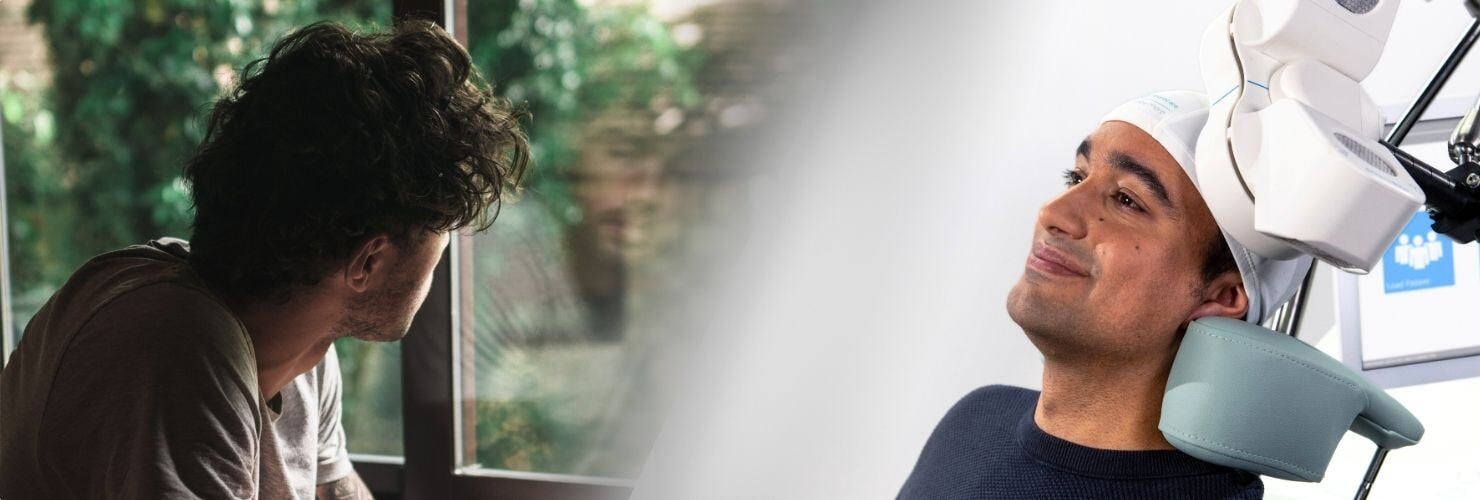TMS Treatment
Transcranial Magnetic Stimulation
TMS (also known as rTMS) treatment is a non-invasive, medication-free treatment, proven effective in treating depression, addiction and many other conditions

Straight to:
Repetitive TMS (Transcranial Magnetic Stimulation) is an innovative treatment which uses pulsing magnetic fields to activate or suppress the brain centres associated with a number of medical and psychiatric disorders.
rTMS treatment was approved for the treatment of depression by the National Institute for Health and Care Excellence (NICE) in 2015. It’s a non-invasive therapy that uses magnetic pulses to stimulate the area of the brain that controls your emotional reactions and regulates mood.

rTMS: repetitive Transcranial Magnetic Stimulation
The type of treatment we provide here at Smart TMS is called repetitive Transcranial Magnetic Stimulation (rTMS). It’s called this because the magnetic treatment coil turns on and off quickly and repetitively.
To keep things simple, we refer to the treatment as TMS throughout this website and our downloadable brochure.
TMS treats the actual brain circuits involved in your condition, rather than flooding the brain with chemicals.
The treatment stimulates the brain and causes ‘neuroplasticity’ – which is the brain’s ability to mend and build connections between the nerve cells. In the case of depression, for example, the left side of the prefrontal cortex is stimulated, restoring the connections to help it work as it should, without the symptoms of depression.
TMS compared to other treatments
| Treatment | TMS | ECT | Antidepressants |
|---|---|---|---|
| Description | Non-invasive magnetic fields | Electrical current to induce seizure | Oral Medication |
| NICE approved | ✓ | ✓ | ✓ |
| Non-invasive | ✓ | ✘ | ✓ |
| Outpatient treatment | ✓ | ✘ | ✓ |
| Ongoing recovery | ✓ | ✘ | ✘ |
| Side-effects | Mild headaches Mild fatigue 1 in 50,000 risk of seizures |
Confusion Disorientation Headaches Intense sleepiness Jaw ache Anesthetic complications Memory loss Muscle aches Nausea |
Anxiety Diarrhoea Dizziness Fatigue Headache Increased appetite Migraine Nausea Nervousness Sleep problems Sexual dysfunction Weight gain |
Conditions TMS treats
Depression
Transcranial Magnetic Stimulation FAQs
-
Repetitive Transcranial Magnetic Stimulation (or rTMS for short) is a treatment for depression, anxiety, OCD, addictions and other mental health conditions. The rTMS machine emits high frequency magnetic pulses to the area of the brain known to cause the condition. The treatment stimulates the brain and causes ‘neuroplasticity’ – which is the brain’s ability to mend and build connections between the nerve cells. In the case of depression, for example, the left side of the prefrontal cortex is stimulated, restoring the connections to help it work as it should, without the symptoms of depression.
-
Although similar, rTMS is more commonly used. Repetitive Transcranial Magnetic Stimulation, which is the NICE approved treatment offered by Smart TMS, uses a magnet referred to by professionals as a ‘figure of eight coil’. This coil emits repetitive magnetic pulses to the specific area of the brain known to cause the condition being treated. In comparison, deep Transcranial Magnetic Stimulation, or dTMS, uses a ‘H-coil’, which looks like a helmet. The magnetic pulses are emitted on a much larger area of the brain as it’s much less focused than rTMS.
-
rTMS is a private treatment and costs vary depending on the condition being treated. An average course of treatment for depression with Smart TMS costs £3,000 and you are likely to need two courses in total.
-
As research progresses, it becomes clear that with regular maintenance sessions (one per month) the benefits of rTMS treatment are on-going. Life can have its ups and downs, but once we know that rTMS treatment works for you, we can offer “top up” sessions whenever you feel you need a boost.
-
There is no research to suggest that rTMS can cause memory loss. rTMS is often compared to ECT (electroconvulsive therapy), which does cause memory loss, however rTMS is non-invasive and only targets a small area of the brain, as opposed to inducing seizures like ECT does.
-
Yes – rTMS is effective in the treatment of Generalised Anxiety Disorder. At Smart TMS, we know that depression and anxiety often go hand in hand, so we offer all patients the opportunity to be treated for both at the same time. Other providers often charge separately for courses of depression and anxiety treatment, but we include them in the same treatment session, saving you (in some cases) thousands of pounds.
-
“Success” is hard to quantify when talking about mental health. The remission rate of patients suffering with depression at Smart TMS is 49%. This means 49% of patients are no longer clinically depressed following rTMS treatment. Our research shows that 56% patients also see a significant change in their mood, even if they don’t officially reach the point of remission, which helps them lead a happy and fulfilling life with fewer symptoms than before.










